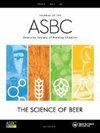布基纳法索种植的FKR 19和FKR 62 N水稻品种谷物、麦芽、麦汁和啤酒的理化、微生物学和感官特性
IF 1.8
4区 农林科学
Q4 BIOTECHNOLOGY & APPLIED MICROBIOLOGY
Journal of the American Society of Brewing Chemists
Pub Date : 2023-01-27
DOI:10.1080/03610470.2022.2163815
引用次数: 0
摘要
摘要本研究旨在通过米啤酒生产促进加工食品的多样化。FKR 19和FKR 62两个水稻品种 N、 被选择用于啤酒生产。在不同的生产步骤中进行了物理化学、微生物和感官分析。生产试验确定了米啤酒生产的流程。从所进行的分析来看,这两个品种的谷物、麦芽、麦芽汁和啤酒表现出相似的物理化学和微生物特征。啤酒样品中的谷物含量、新鲜物质含量、蛋白质6.8-7%、总糖81.4-82.1%和脂肪0.9-1.0%分别降至0.1%、4.8-3.5%和0.3-0.4%的最终水平。最终产物中的pH值稳定在3.2,而醇的含量为3.5%(v/v)。微生物载量低于1 CFU/g。三角试验显示FKR 19和FKR 62在味道上存在差异 N啤酒,尽管在配对偏好测试中没有表现出显著的偏好。在涉及其他类型发酵饮料的排名测试之后,聚类建议根据原料和/或加工的接近程度进行分类。这项调查的数据应该有助于酿酒商实现产品多样化,并刺激西非酿酒业。本文章由计算机程序翻译,如有差异,请以英文原文为准。
Physico-Chemical, Microbiological, and Sensorial Characteristics of Grains, Malt, Wort, and Beer from FKR 19 and FKR 62 N Rice Varieties Grown in Burkina Faso
Abstract This study aims to contribute to the diversification of processed food products through rice beer production. Two varieties of rice, FKR 19 and FKR 62 N, were selected for beer production. Physico-chemical, microbial, and sensorial analyses were performed at different steps of production. The production trials led to the determination of a flow process for rice beer production. From the analyses performed, grains, malt, wort, and beer from the two varieties expressed similar physico-chemical and microbial profiles. Grain content, fresh matter basis, protein 6.8–7%, total sugar 81.4–82.1%, and fats 0.9–1.0%, were depleted to final levels of 0.1%, 4.8–3.5%, and 0.3–0.4% respectively in beer samples. The pH value in the end products was stabilized at 3.2, while the level of alcohol was 3.5% (v/v). Microbial loads were below 1 CFU/g. The triangular test showed a difference in taste between FKR 19 and FKR 62 N beers, although no significant preference was expressed under the paired preference test. Following the ranking test, which involved other types of fermented drinks, the clustering suggested a classification based on closeness of raw materials and/or processing. Data from this investigation should help brewers diversify their products and stimulate the West African brewing sector.
求助全文
通过发布文献求助,成功后即可免费获取论文全文。
去求助
来源期刊

Journal of the American Society of Brewing Chemists
工程技术-生物工程与应用微生物
CiteScore
4.00
自引率
20.00%
发文量
41
审稿时长
3 months
期刊介绍:
The Journal of the American Society of Brewing Chemists publishes scientific papers, review articles, and technical reports pertaining to the chemistry, microbiology, and technology of brewing and distilling, as well as the analytical techniques used in the malting, brewing, and distilling industries.
 求助内容:
求助内容: 应助结果提醒方式:
应助结果提醒方式:


